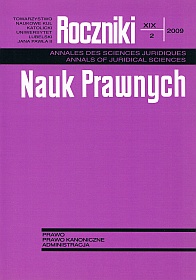Protection of Copyright for the Documents Written by John Paul II (Karol Wojtyła), Benedict XVI (Joseph Ratzinger)
Abstract
Copyright law constitutes part of intellectual property law and includes, in a narrower sense, a collection of laws established with a view to protecting the interests of creators and legal relations connected with the creation of works, their use and protection. In a broader sense, this notion covers the regulations relating to the so-called ancillary rights (exclusive rights), granted to performers, producers of phonograms (sound recordings), radio and television broadcasters. The matter is regulated in detail by Art. 1 of the Copyright and Ancillary Rights Act of the Republic of Poland of 4 February, 1994. The Author focuses on the norms of Canon Law contained in both codifications of John Paul II. Although copyright law generally does not belong to the ecclesiastical domain of law, the Author tries to locate places or at least „their traces” where the legislator points to norms of conducts in this relatively unexplored matter. Yet the core of the present considerations are documents retrieved from the materials collected in the archive of the Secretariat of the Polish Episcopate Conference in Warsaw. It is to be noted that both the Holy See and Poland are parties to international agreements connected with protection of copyright. Therefore, the fact that the Holy See participates in these agreements constitutes a proof of its willingness to provide due legal protection of an author.
In summary, one may conclude that the current law of the Catholic Church recognizes the necessity to legally protect papal documents and those of the Holy See. As new modes of publication have become available, the Church legislator has introduced new directives. In order to provide a more efficient protection, the legislator makes a reference to secular legislation of a given country and to abovementioned international conventions. Although there remains much to be done in this vital yet delicate matter, it is to be hoped that the Catholic Church will incorporate in its legislation the new and more effective norms of protection of papal documents and those of the Holy See.
Copyright (c) 2009 Roczniki Nauk Prawnych

This work is licensed under a Creative Commons Attribution-NonCommercial-NoDerivatives 4.0 International License.


